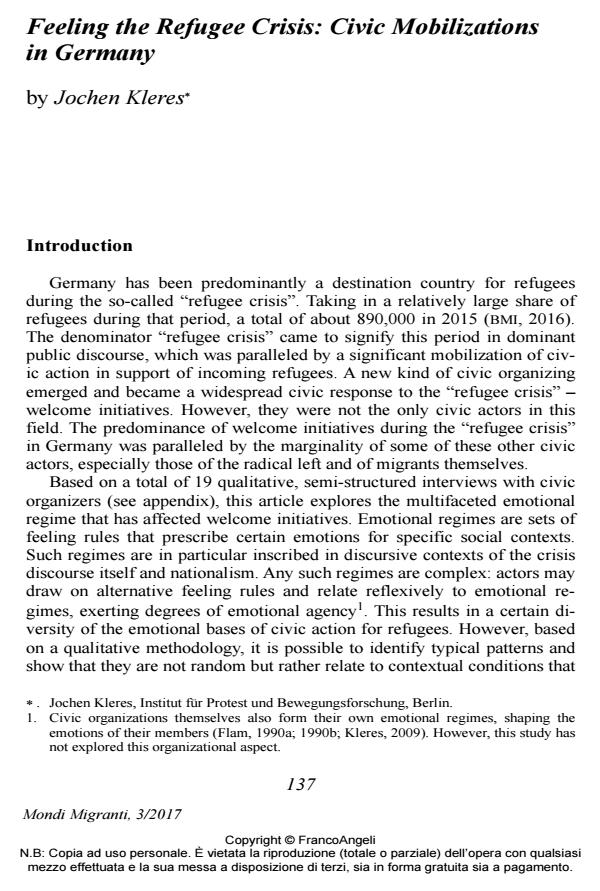Feeling the Refugee Crisis: Civic Mobilizations in Germany
Titolo Rivista MONDI MIGRANTI
Autori/Curatori Jochen Kleres
Anno di pubblicazione 2018 Fascicolo 2017/3
Lingua Inglese Numero pagine 24 P. 137-160 Dimensione file 211 KB
DOI 10.3280/MM2017-003007
Il DOI è il codice a barre della proprietà intellettuale: per saperne di più
clicca qui
Qui sotto puoi vedere in anteprima la prima pagina di questo articolo.
Se questo articolo ti interessa, lo puoi acquistare (e scaricare in formato pdf) seguendo le facili indicazioni per acquistare il download credit. Acquista Download Credits per scaricare questo Articolo in formato PDF

FrancoAngeli è membro della Publishers International Linking Association, Inc (PILA)associazione indipendente e non profit per facilitare (attraverso i servizi tecnologici implementati da CrossRef.org) l’accesso degli studiosi ai contenuti digitali nelle pubblicazioni professionali e scientifiche
Germany has been a key destination for refugees during the so-called refugee crisis and has taken on larger numbers of refugees during that period. Civic mobilizations in this context feature the emergence of so-called welcome initiatives. A primary focus of these initiatives has been to provide stop-gap help to incoming refugees, that is chiefly attending to migrants’ basic needs for food, clothing, accomodation, transportation, legal advice, language etc. These are new entries into the field of pro-immigrant civic initiatives, adding to pre-existing interest associations, church-related, leftist and refugees’ self organized organizations and mobilizations. This chapter charts these novel, welcome mobilizations in order to analyze their emotional bases in a comparative perspective. Fundamental to this is the distinction of pity, compassion, and (political) solidarity as emotions of apprehending others’ suffering. With Arendt it can be argued that compassion and pity tend to depoliticize civic action, while solidarity may politicize activists. Applying this analytical lens brings into relief to what extend welcome initiatives are politicized or depoliticized, operating more as political activism or humanitarianism. This comes into particular relief when comparing welcome initiatives with other, pre-existing mobilizations, especially of the radical left and by migrants themselves.
Parole chiave:Emotion, refugee crisis, solidarity, compassion, pity, Germany.
- Research group as helpers due to the war in Ukraine: Focus group experiences of women researchers Xenia Roszik-Volovik, Anna Paula Brandão, Nóra Kollárovics, Bernadett Frida Farkas, Eszter Frank-Bozóki, Lili Olga Horváth, Zsuzsa Kaló, Lan Anh Nguyen Luu, Judit Balazs, in Frontiers in Psychiatry 1139252/2023
DOI: 10.3389/fpsyt.2023.1139252 - Humanitarian Help and Refugees: De-Bordering Solidarity as a Contentious Issue Maurizio Ambrosini, in Journal of Immigrant & Refugee Studies /2024 pp.517
DOI: 10.1080/15562948.2022.2059823 - Revealing activist experiences through film-viewing: emotional geographies at the border of Ceuta and Melilla Silvia Almenara-Niebla, in Social & Cultural Geography /2025 pp.119
DOI: 10.1080/14649365.2024.2384399 - The Urban Governance of Asylum as a “Battleground”: Policies of Exclusion and Efforts of Inclusion in Italian Towns Maurizio Ambrosini, in Geographical Review /2021 pp.187
DOI: 10.1080/00167428.2020.1735938 - The battleground of asylum and immigration policies: a conceptual inquiry Maurizio Ambrosini, in Ethnic and Racial Studies /2021 pp.374
DOI: 10.1080/01419870.2020.1836380 - The transnationalized social question and immigration policies: three comments and one question in regard to an outstanding study Maurizio Ambrosini, in Ethnic and Racial Studies /2021 pp.1382
DOI: 10.1080/01419870.2021.1875135 - Solidarity with Ukrainian war refugees in Polanders’ epistolary narratives (based on the study of southern and eastern regions of Poland) Artur Fabiś, Dorota Gierszewski, Liliya Morska, in Media, War & Conflict /2024 pp.292
DOI: 10.1177/17506352231203642
Jochen Kleres, Feeling the Refugee Crisis: Civic Mobilizations in Germany in "MONDI MIGRANTI" 3/2017, pp 137-160, DOI: 10.3280/MM2017-003007